We wouldn’t dream of abandoning our vast semi–annual Most Anticipated Book Previews, but we thought a monthly reminder would be helpful (and give us a chance to note titles we missed the first time around). Here’s what we’re looking out for this month—for more February titles, check out our First-Half Preview. Let us know what you’re looking forward to in the comments!
Want to learn more about upcoming titles? Then go read our most recent book preview. Want to help The Millions keep churning out great books coverage? Then sign up to be a member today.
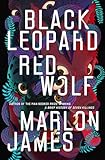 Black Leopard, Red Wolf by Marlon James: Following up his Man Booker Prize for A Brief History of Seven Killings, James has written the first book in what is to be an epic trilogy that is part Lord of the Rings, part Game of Thrones, and part Black Panther. In this first volume, a band of mercenaries—made up of a witch, a giant, a buffalo, a shape-shifter, and a bounty hunter who can track anyone by smell (his name is Tracker)—are hired to find a boy, missing for three years, who holds special interest for the king. (Janet)
Black Leopard, Red Wolf by Marlon James: Following up his Man Booker Prize for A Brief History of Seven Killings, James has written the first book in what is to be an epic trilogy that is part Lord of the Rings, part Game of Thrones, and part Black Panther. In this first volume, a band of mercenaries—made up of a witch, a giant, a buffalo, a shape-shifter, and a bounty hunter who can track anyone by smell (his name is Tracker)—are hired to find a boy, missing for three years, who holds special interest for the king. (Janet)
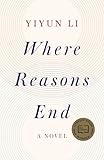 Where Reasons End by Yiyun Li: Where Reasons End is the latest novel by the critically acclaimed author of Dear Friend, from My Life I Write to You in Your Life. Li creates this fictional space where a mother can have an eternal, carefree conversation with her child Nikolai, who commits suicide at the age of 16. Suffused with intimacy and deepest sorrows, the book captures the affections and complexity of parenthood in a way that has never been portrayed before. (Jianan)
Where Reasons End by Yiyun Li: Where Reasons End is the latest novel by the critically acclaimed author of Dear Friend, from My Life I Write to You in Your Life. Li creates this fictional space where a mother can have an eternal, carefree conversation with her child Nikolai, who commits suicide at the age of 16. Suffused with intimacy and deepest sorrows, the book captures the affections and complexity of parenthood in a way that has never been portrayed before. (Jianan)
 The Collected Schizophrenias by Esmé Weijun Wang: Wang writes brilliantly and beautifully about lives lived with mental illness. Her first novel, The Border of Paradise, traces a family through generations, revealing the ways each becomes inheritors of the previous generation’s isolation and depression. In The Collected Schizophrenias, her first essay collection (for which she was awarded the Whiting Award and Greywolf Nonfiction Prize), Wang draws from her experience as both patient and speaker/advocate navigating the vagaries of the mental healthcare system while also shedding light on the ways it robs patients of autonomy. What’s most astonishing is how Wang writes with such intelligence, insight, and care about her own struggle to remain functional while living with schizoaffective disorder. (Anne)
The Collected Schizophrenias by Esmé Weijun Wang: Wang writes brilliantly and beautifully about lives lived with mental illness. Her first novel, The Border of Paradise, traces a family through generations, revealing the ways each becomes inheritors of the previous generation’s isolation and depression. In The Collected Schizophrenias, her first essay collection (for which she was awarded the Whiting Award and Greywolf Nonfiction Prize), Wang draws from her experience as both patient and speaker/advocate navigating the vagaries of the mental healthcare system while also shedding light on the ways it robs patients of autonomy. What’s most astonishing is how Wang writes with such intelligence, insight, and care about her own struggle to remain functional while living with schizoaffective disorder. (Anne)
 American Spy by Lauren Wilkinson: It’s the mid-1980s and American Cold War adventurism has set its sights on the emerging west African republic of Burkina Faso. There’s only one problem: the agent sent to help swing things America’s way is having second, and third, thoughts. The result is an engaging and intelligent stew of espionage and post-colonial political agency, but more important, a confessional account examining our baser selves and our unscratchable itch to fight wars that cannot be won. (Il’ja)
American Spy by Lauren Wilkinson: It’s the mid-1980s and American Cold War adventurism has set its sights on the emerging west African republic of Burkina Faso. There’s only one problem: the agent sent to help swing things America’s way is having second, and third, thoughts. The result is an engaging and intelligent stew of espionage and post-colonial political agency, but more important, a confessional account examining our baser selves and our unscratchable itch to fight wars that cannot be won. (Il’ja)
 Lost Children Archive by Valeria Luiselli: The two-time finalist for the National Book Critic’s Circle Award has written a road novel for America in the 21st century. In the book, a family of four set out from their home in New York to visit a place in Arizona called Apacheria, a.k.a. the region once inhabited by the Apache tribe. On their way down south, the family reveals their own set of long-simmering conflicts, while the radio gives updates on an “immigration crisis” at the border. (Thom)
Lost Children Archive by Valeria Luiselli: The two-time finalist for the National Book Critic’s Circle Award has written a road novel for America in the 21st century. In the book, a family of four set out from their home in New York to visit a place in Arizona called Apacheria, a.k.a. the region once inhabited by the Apache tribe. On their way down south, the family reveals their own set of long-simmering conflicts, while the radio gives updates on an “immigration crisis” at the border. (Thom)
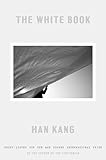 The White Book by Han Kang (translated by Deborah Smith): In 2016, Kang’s stunning novel The Vegetarian won the Man Booker Prize; in 2018, she drew Man Booker attention again with her autobiographical work The White Book. There are loose connections between the two—both concern sisters, for one, and loss, and both feature Han’s beautiful, spare prose—but The White Book is less a conventional story and more like a meditation in fragments. Written about and to the narrator’s older sister, who died as a newborn, and about the white objects of grief, Han’s work has been likened to “a secular prayer book,” one that “investigates the fragility, beauty and strangeness of life.” (Kaulie)
The White Book by Han Kang (translated by Deborah Smith): In 2016, Kang’s stunning novel The Vegetarian won the Man Booker Prize; in 2018, she drew Man Booker attention again with her autobiographical work The White Book. There are loose connections between the two—both concern sisters, for one, and loss, and both feature Han’s beautiful, spare prose—but The White Book is less a conventional story and more like a meditation in fragments. Written about and to the narrator’s older sister, who died as a newborn, and about the white objects of grief, Han’s work has been likened to “a secular prayer book,” one that “investigates the fragility, beauty and strangeness of life.” (Kaulie)
 Bangkok Wakes to Rain by Pitchaya Sudbanthad: NYFA Fellow Sudbanthad’s debut novel, Bangkok Wakes to Rain, has already been hailed as “important, ambitious, and accomplished,” by Mohsin Hamid, and a book that “brilliantly sounds the resonant pulse of the city in a wise and far-reaching meditation on home,” by Claire Vaye Watkins. This polyphonic novel follows myriad characters—from a self-exiled jazz pianist to a former student revolutionary—through the thresholds of Bangkok’s past, present, and future. Sudbanthad, who splits his time between Bangkok and New York, says he wrote the novel by letting his mind wander the city of his birth: “I arrived at the site of a house that, to me, became a theatrical stage where characters…entered and left; I followed them, like a clandestine voyeur, across time and worlds, old and new.” (Anne)
Bangkok Wakes to Rain by Pitchaya Sudbanthad: NYFA Fellow Sudbanthad’s debut novel, Bangkok Wakes to Rain, has already been hailed as “important, ambitious, and accomplished,” by Mohsin Hamid, and a book that “brilliantly sounds the resonant pulse of the city in a wise and far-reaching meditation on home,” by Claire Vaye Watkins. This polyphonic novel follows myriad characters—from a self-exiled jazz pianist to a former student revolutionary—through the thresholds of Bangkok’s past, present, and future. Sudbanthad, who splits his time between Bangkok and New York, says he wrote the novel by letting his mind wander the city of his birth: “I arrived at the site of a house that, to me, became a theatrical stage where characters…entered and left; I followed them, like a clandestine voyeur, across time and worlds, old and new.” (Anne)
 The Source of Self-Regard by Toni Morrison: A new collection of nonfiction–speeches, essays, criticism, and reflections–from the Nobel-prize winning Morrison. Publishers Weekly says “Some superb pieces headline this rich collection…Prescient and highly relevant to the present political moment…” (Lydia)
The Source of Self-Regard by Toni Morrison: A new collection of nonfiction–speeches, essays, criticism, and reflections–from the Nobel-prize winning Morrison. Publishers Weekly says “Some superb pieces headline this rich collection…Prescient and highly relevant to the present political moment…” (Lydia)
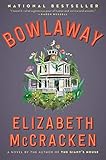 Bowlaway by Elizabeth McCracken: It’s hard to believe it’s been 20 years since McCracken published her first novel, The Giant’s House, perhaps because, since then, she’s given us two brilliant short story collections and one of the most powerful memoirs in recent memory. Her fans will no doubt rejoice at the arrival of this second novel, which follows three generations of a family in a small New England town. Bowlaway refers to a candlestick bowling alley that Publishers Weekly, in its starred review, calls “almost a character, reflecting the vicissitudes of history that determine prosperity or its opposite.” In its own starred review, Kirkus praises McCracken’s “psychological acuity.” (Edan)
Bowlaway by Elizabeth McCracken: It’s hard to believe it’s been 20 years since McCracken published her first novel, The Giant’s House, perhaps because, since then, she’s given us two brilliant short story collections and one of the most powerful memoirs in recent memory. Her fans will no doubt rejoice at the arrival of this second novel, which follows three generations of a family in a small New England town. Bowlaway refers to a candlestick bowling alley that Publishers Weekly, in its starred review, calls “almost a character, reflecting the vicissitudes of history that determine prosperity or its opposite.” In its own starred review, Kirkus praises McCracken’s “psychological acuity.” (Edan)
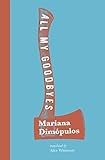 All My Goodbyes by Mariana Dimópulos (translated by Alice Whitmore): Argentinian writer Dimópulos’s first book in English is a novel that focuses on a narrator who has been traveling for a decade. The narrator reflects on her habit of leaving family, countries, and lovers. And when she decides to commit to a relationship, her lover is murdered, adding a haunting and sorrowful quality to her interiority. Julie Buntin writes, “The scattered pieces of her story—each of them wonderfully distinct, laced with insight, violence, and sensuality—cohere into a profound evocation of restlessness, of the sublime and imprisoning act of letting go.” (Zoë)
All My Goodbyes by Mariana Dimópulos (translated by Alice Whitmore): Argentinian writer Dimópulos’s first book in English is a novel that focuses on a narrator who has been traveling for a decade. The narrator reflects on her habit of leaving family, countries, and lovers. And when she decides to commit to a relationship, her lover is murdered, adding a haunting and sorrowful quality to her interiority. Julie Buntin writes, “The scattered pieces of her story—each of them wonderfully distinct, laced with insight, violence, and sensuality—cohere into a profound evocation of restlessness, of the sublime and imprisoning act of letting go.” (Zoë)
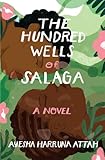 The Hundred Wells of Salaga by Ayesha Harruna Attah: An account of 19th-century Ghana, the novel follows two
The Hundred Wells of Salaga by Ayesha Harruna Attah: An account of 19th-century Ghana, the novel follows two
young girls, Wurche and Aminah, who live in the titular city which is a notorious center preparing people for sale as slaves to Europeans and Americans. Attah’s novel gives a texture and specificity to the anonymous tales of the Middle Passage, with critic Nadifa Mohamad writing in The Guardian that “One of the strengths of the novel is that it complicates the idea of what ‘African history’ is.” (Ed)
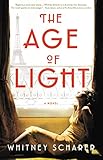 The Age of Light by Whitney Scharer: This much sought-after debut, which was the object of a bidding war, is based on the life of Lee Miller, a Vogue model turned photographer who decided she would rather “take a picture than be one.” The novel focuses on Miller’s tumultuous romance with photographer Man Ray in early 1930s Paris, as Miller made the transition from muse to artist. Early reviews suggests that the novel more than lives up to its promise, with readers extolling its complicated heroine and page-turning pacing. (Hannah)
The Age of Light by Whitney Scharer: This much sought-after debut, which was the object of a bidding war, is based on the life of Lee Miller, a Vogue model turned photographer who decided she would rather “take a picture than be one.” The novel focuses on Miller’s tumultuous romance with photographer Man Ray in early 1930s Paris, as Miller made the transition from muse to artist. Early reviews suggests that the novel more than lives up to its promise, with readers extolling its complicated heroine and page-turning pacing. (Hannah)
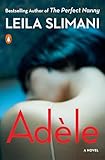 Adèle by Leila Slimani (translated by Sam Taylor): Slimani, who won the Prix Goncourt in 2016, became famous after publishing Dans le jardin de l’ogre, which is now being translated and published in English as Adèle. The French-Moroccon novelist’s debut tells the story of a titular heroine whose burgeoning sex addiction threatens to ruin her life. Upon winning an award in Morocco for the novel, Slimani said its primary focus is her character’s “loss of self.” (Thom)
Adèle by Leila Slimani (translated by Sam Taylor): Slimani, who won the Prix Goncourt in 2016, became famous after publishing Dans le jardin de l’ogre, which is now being translated and published in English as Adèle. The French-Moroccon novelist’s debut tells the story of a titular heroine whose burgeoning sex addiction threatens to ruin her life. Upon winning an award in Morocco for the novel, Slimani said its primary focus is her character’s “loss of self.” (Thom)
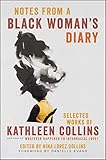 Notes From a Black Woman’s Diary by Kathleen Collins: Not long after completing her first feature film, Losing Ground, in 1982, Collins died from breast cancer at age 46. In 2017, her short story collection about the lives and loves of black Americans in the 1960s, Whatever Happened to Interracial Love?, was published to ringing critical acclaim. Now comes Notes From a Black Woman’s Diary, which is much more than the title suggests. In addition to autobiographical material, the book includes fiction, plays, excerpts from an unfinished novel, and the screenplay of Losing Ground, with extensive directorial notes. This book is sure to burnish Collins’s flourishing posthumous reputation. (Bill)
Notes From a Black Woman’s Diary by Kathleen Collins: Not long after completing her first feature film, Losing Ground, in 1982, Collins died from breast cancer at age 46. In 2017, her short story collection about the lives and loves of black Americans in the 1960s, Whatever Happened to Interracial Love?, was published to ringing critical acclaim. Now comes Notes From a Black Woman’s Diary, which is much more than the title suggests. In addition to autobiographical material, the book includes fiction, plays, excerpts from an unfinished novel, and the screenplay of Losing Ground, with extensive directorial notes. This book is sure to burnish Collins’s flourishing posthumous reputation. (Bill)
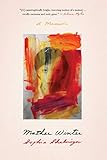 Mother Winter by Sophia Shalmiyev: This debut is the memoir of a young woman’s life shaped by unrelenting existential terror. The story is told in fragmentary vignettes beginning with Shalmiyev’s fraught emigration as a young child from St. Petersburg, Russia to the United States, leaving behind the mother who had abandoned her. It closes with her resolve to find her estranged mother again. (Il’ja)
Mother Winter by Sophia Shalmiyev: This debut is the memoir of a young woman’s life shaped by unrelenting existential terror. The story is told in fragmentary vignettes beginning with Shalmiyev’s fraught emigration as a young child from St. Petersburg, Russia to the United States, leaving behind the mother who had abandoned her. It closes with her resolve to find her estranged mother again. (Il’ja)
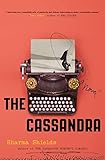 The Cassandra by Sharma Shields: Mildred Groves, The Cassandra’s titular prophetess, sometimes sees flashes of the future. She is also working at the top-secret Hanford Research Center in the 1940s, where the seeds of atomic weapons are sown and where her visions are growing more horrifying—and going ignored at best, punished at worst. Balancing thorough research and mythic lyricism, Shields’s novel is a timely warning of what happens when warnings go unheeded. (Kaulie)
The Cassandra by Sharma Shields: Mildred Groves, The Cassandra’s titular prophetess, sometimes sees flashes of the future. She is also working at the top-secret Hanford Research Center in the 1940s, where the seeds of atomic weapons are sown and where her visions are growing more horrifying—and going ignored at best, punished at worst. Balancing thorough research and mythic lyricism, Shields’s novel is a timely warning of what happens when warnings go unheeded. (Kaulie)
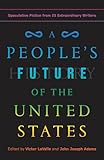 A People’s Future of the United States edited by Victor LaValle and John Joseph Adams: An anthology of 25 speculative stories from a range of powerful storytellers, among them Maria Dahvana Headley, Daniel José Older, and Alice Sola Kim. LaValle and Adams sought stories that imagine a derailed future—tales that take our fractured present and make the ruptures even further. Editor LaValle, an accomplished speculative fiction writer himself (most recently The Changeling, and my personal favorite, the hilarious and booming Big Machine), is the perfect writer to corral these stories. LaValle has said “one of the great things about horror and speculative fiction is that you are throwing people into really outsized, dramatic situations a lot…[including] racism and sexism and classism, biases against the mentally ill”—the perfect description for this dynamic collection. (Nick R.)
A People’s Future of the United States edited by Victor LaValle and John Joseph Adams: An anthology of 25 speculative stories from a range of powerful storytellers, among them Maria Dahvana Headley, Daniel José Older, and Alice Sola Kim. LaValle and Adams sought stories that imagine a derailed future—tales that take our fractured present and make the ruptures even further. Editor LaValle, an accomplished speculative fiction writer himself (most recently The Changeling, and my personal favorite, the hilarious and booming Big Machine), is the perfect writer to corral these stories. LaValle has said “one of the great things about horror and speculative fiction is that you are throwing people into really outsized, dramatic situations a lot…[including] racism and sexism and classism, biases against the mentally ill”—the perfect description for this dynamic collection. (Nick R.)
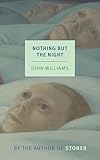 Nothing but the Night by John Williams: The John Williams of
Nothing but the Night by John Williams: The John Williams of
Stoner fame revival continues with the reissue of his first novel by NYRB, first published in 1948, a story dealing with mental illness and trauma with echoes of Greek tragedy. (Lydia)
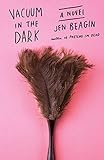 Vacuum in the Dark by Jen Beagin: Whiting Award winner Beagin is back with a sequel to her debut novel, Pretend I’m Dead. Two-years older, Mona is living in New Mexico and working as a cleaning woman. In an attempt to start over, Mona must heal wounds both new and old—and figure out who she wants to be. Dark, sharp, and poignant, Publishers Weekly‘s starred review calls the novel “viciously smart and morbidly funny.” (Carolyn)
Vacuum in the Dark by Jen Beagin: Whiting Award winner Beagin is back with a sequel to her debut novel, Pretend I’m Dead. Two-years older, Mona is living in New Mexico and working as a cleaning woman. In an attempt to start over, Mona must heal wounds both new and old—and figure out who she wants to be. Dark, sharp, and poignant, Publishers Weekly‘s starred review calls the novel “viciously smart and morbidly funny.” (Carolyn)
 Willa & Hesper by Amy Feltman: Feltman’s debut coming-of-age novel follows two queer woman who meet at their MFA program, fall in love, and then break up. In an effort to heal, both leave New York and travel to their respective ancestral homelands: Germany (Willa) and Tbilisi, Georgia (Hesper) Author Crystal Hana Kim called the novel “a lyrical, timely story about love, heartbreak, and healing.” (Carolyn)
Willa & Hesper by Amy Feltman: Feltman’s debut coming-of-age novel follows two queer woman who meet at their MFA program, fall in love, and then break up. In an effort to heal, both leave New York and travel to their respective ancestral homelands: Germany (Willa) and Tbilisi, Georgia (Hesper) Author Crystal Hana Kim called the novel “a lyrical, timely story about love, heartbreak, and healing.” (Carolyn)
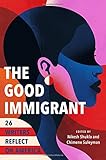 The Good Immigrant edited by Nikesh Shukla and Chimene Suleyman: In a follow-up to their UK edition, editors Shukla (The One Who Wrote Destiny) and Suleyman (Outside Looking On) gather 26 writers and scholars to write on the immigrant experience—many of which are in response to post-2016 America—including Porochista Khakpour, Teju Cole, Alexander Chee, and Jenny Zhang. With “joy, empathy, and fierceness,” Publishers Weekly‘s starred review called the collection “a gift for anyone who understands or wants to learn about the breadth of experience among immigrants to the U.S.” (Carolyn)
The Good Immigrant edited by Nikesh Shukla and Chimene Suleyman: In a follow-up to their UK edition, editors Shukla (The One Who Wrote Destiny) and Suleyman (Outside Looking On) gather 26 writers and scholars to write on the immigrant experience—many of which are in response to post-2016 America—including Porochista Khakpour, Teju Cole, Alexander Chee, and Jenny Zhang. With “joy, empathy, and fierceness,” Publishers Weekly‘s starred review called the collection “a gift for anyone who understands or wants to learn about the breadth of experience among immigrants to the U.S.” (Carolyn)








